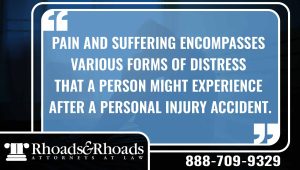
When involved in a personal injury case, understanding pain and suffering is crucial for victims seeking fair compensation. These laws cover both physical pain and suffering as well as emotional distress caused by injuries.
What Is Pain and Suffering?
 Pain and suffering encompasses various forms of distress that a person might experience after a personal injury accident.
Pain and suffering encompasses various forms of distress that a person might experience after a personal injury accident.
This includes:
- Physical pain: Actual pain resulting from injuries such as broken bones, dislocated joints, disc herniations, or chronic conditions
- Emotional distress: Psychological impact, including anxiety, depression, and PTSD
- Mental anguish: Fear, humiliation, and other severe emotional responses
- Cognitive changes: Alterations in mental function, often resulting from traumatic brain injury
Types of Pain and Suffering and Emotional Distress
Pain and suffering can be broadly categorized into two types:
- Physical pain and suffering: This refers to the actual pain and discomfort caused by physical injuries. Examples include neck pain, back pain, and injuries that lead to chronic pain.
- Emotional and mental pain and suffering: Mental pain encompasses the emotional trauma and psychological effects of the injury, such as Post-Traumatic Stress Disorder, severe anxiety, or depression. This suffering includes negative emotions like fear, anger, and loss of enjoyment of life.
What Causes Physical Pain and Suffering?
Common scenarios where this trauma may occur include:
- Car or Truck accidents: Victims of a car or truck accidents might experience severe injuries and significant emotional distress
- Medical malpractice: Patients who suffer from incorrect or delayed diagnoses can experience both physical pain and emotional trauma
- Workplace accidents: Injuries sustained on the job can lead to long-term physical pain and suffering
Legal Basis for Pain and Suffering Claims
Pain and suffering is a legal term used in personal injury lawsuits. It provides the framework for seeking compensation for non-economic damages caused by physical and emotional injuries. The primary goal is to make the injured party “whole” again through monetary compensation.
Calculating Pain and Suffering Damages
 To calculate pain and suffering damages involves quantifying non-economic losses.
To calculate pain and suffering damages involves quantifying non-economic losses.
Two main of many methods that be are used:
- Multiplier Method: This involves multiplying the total economic damages (such as medical bills and lost wages) by a factor (typically between 1.5 and 5) based on the severity of the injury and its impact on the victim’s life.
- Per Diem Method: This method assigns a daily rate to the anguish endured and multiplies it by the number of days the victim is expected to suffer.
Factors influencing the amount of pain and suffering compensation include:
- Severity of injury
- Impact on quality of life
- Duration of recovery
- Emotional aspects and psychological damages
State-Specific Regulations in Kentucky
In Kentucky, damages are awarded as part of compensatory damages in a personal injury case. The state recognizes the importance of compensating victims for both physical and emotional pain caused by injuries.
Key points about Kentucky’s laws:
- No cap on pain and suffering damages
- Statute of limitations is typically two (2) years from the date of injury or accident in motor vehicle accidents and one (1) year from date of accident/injury in most of the injury claims.
- Both economic and non-economic losses are considered, including lost wages
Filing a Pain and Suffering Claim
To file a pain and suffering claim, the victim must meet certain eligibility criteria:
- Proving negligence: Clear evidence that the defendant’s negligence caused the injury
- Documented injuries: Well-documented injuries through medical records and expert evaluations
- Statute of limitations: Filing within the legal time frame (typically one (1) year in Kentucky, unless accident/injury involves a motor vehicle, which can then be two (2) years)
The Process
The legal process for filing a personal injury claim involves:
- Documentation and evidence gathering: Collecting medical statements, car accident reports, and witness statements
- Hiring an attorney: Consulting with a personal injury lawyer to evaluate the case
- Negotiating with insurance companies: Attempting to reach a fair settlement
- Going to court (if necessary): Taking the case to trial if a settlement cannot be reached
Challenges of Proving Pain and Suffering
One of the primary challenges in pain and suffering claims is proving the extent of the anguish experienced. Unlike economic damages, this is subjective and can be difficult to quantify.
Importance of Evidence
- Medical records and expert testimony: These provide essential evidence of injuries and treatment received. Expert testimony from medical professionals or retained experts can validate the severity of the trauma.
- Psychological evaluations: These play a critical role in proving emotional and mental anguish, providing insights into the victim’s psychological state.
- Personal journals: Keeping a personal journal documenting daily pain levels, emotional state, and limitations can serve as valuable evidence.
- Testimony from family members: Family members can provide accounts of how the injury has affected the victim’s daily life and relationships.
- Mental health counselor reports: Evaluations and reports from mental health professionals can substantiate claims of emotional pain and psychological damages.
Dealing with Insurance Companies
Negotiating with the insurance company can be challenging, as they often aim to minimize compensation. Having a skilled attorney can help navigate these negotiations and seek compensation for pain and suffering.
Rhoads & Rhoads Can Help Your Personal Injury Case
An experienced personal injury attorney at Rhoads & Rhoads can be invaluable in pain and suffering cases. We’re here to ease your burden, guiding you with care and competence through each step of your legal journey.
We can assist by:
- Evaluating the extent of pain and suffering
- Gathering comprehensive evidence
- Working with medical experts
- Presenting evidence convincingly
- Negotiating with the insurance company
- Representing the victim in court if necessary
Determining Pain and Suffering Damages
When determining pain and suffering damages, several factors are considered:
- Severity of injuries sustained
- Impact on daily life and activities
- Duration of recovery and long-term prognosis
- Emotional facets and psychological damage
- Medical expenses and actual damages incurred
In some cases, punitive damages may be awarded, especially if the defendant has a criminal record or showed gross negligence.
Personal Injury FAQ
How is suffering calculated in a personal injury lawsuit?
This is typically calculated using either the multiplier method or the per diem method, based on the plaintiff’s pain and individual circumstances.
Can I file a wrongful death claim for a family member?
Yes, in personal injury cases where negligence led to a loved one’s death, family members may be eligible to file a wrongful death claim.
How can I prove pain damages in court?
Pain and suffering can be proved through medical bills, expert testimony, personal documentation of your experience, and testimony from family or mental health professionals.
Consult with Rhoads & Rhoads About Pain and Suffering Law
Unlike with broken or fractured bones, navigating pain and suffering laws can be complex, but understanding your rights and the legal process is essential for seeking appropriate compensation. If you or a loved one has suffered injuries due to someone else’s negligence, it’s crucial to seek professional legal advice from Rhoads & Rhoads in Kentucky. Leveraging 50 years of legal experience in Western Kentucky, we provide knowledgeable counsel.
Remember, pain and suffering refers to both the physical and emotional aspects of your injuries. A skilled attorney will use good sense and expertise to build a strong case, considering all relevant factors to determine a fair dollar value for your suffering.
By understanding the nuances of pain and suffering laws and working with a compassionate personal injury attorney, victims can increase their chances of receiving fair compensation.
Schedule a free case evaluation with one of our lawyers today by calling us at 888-709-9329.


